牛津译林版英语七年级下Unit 8 Pets知识点复习汇总
文档属性
| 名称 | 牛津译林版英语七年级下Unit 8 Pets知识点复习汇总 |
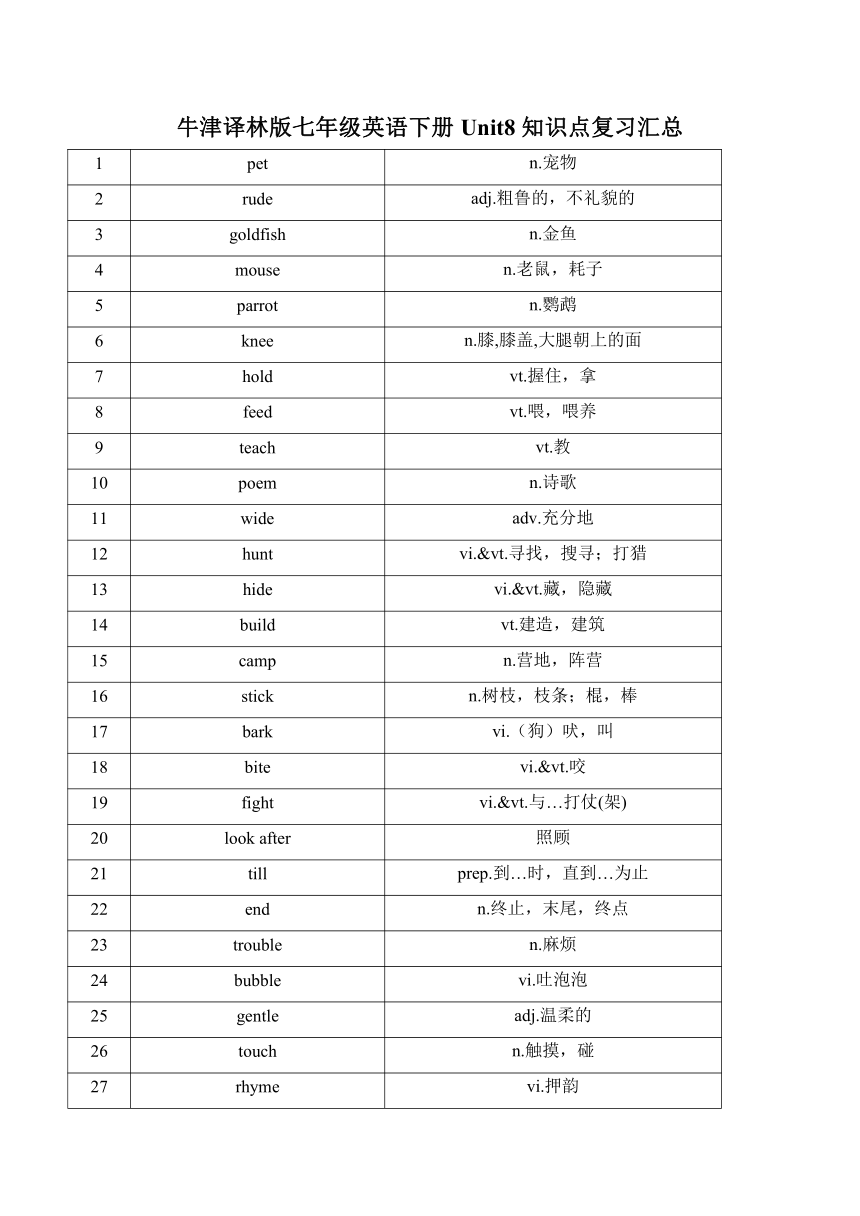
|
|
| 格式 | doc | ||
| 文件大小 | 121.5KB | ||
| 资源类型 | 教案 | ||
| 版本资源 | 牛津译林版 | ||
| 科目 | 英语 | ||
| 更新时间 | 2021-05-28 09:36:12 | ||
图片预览

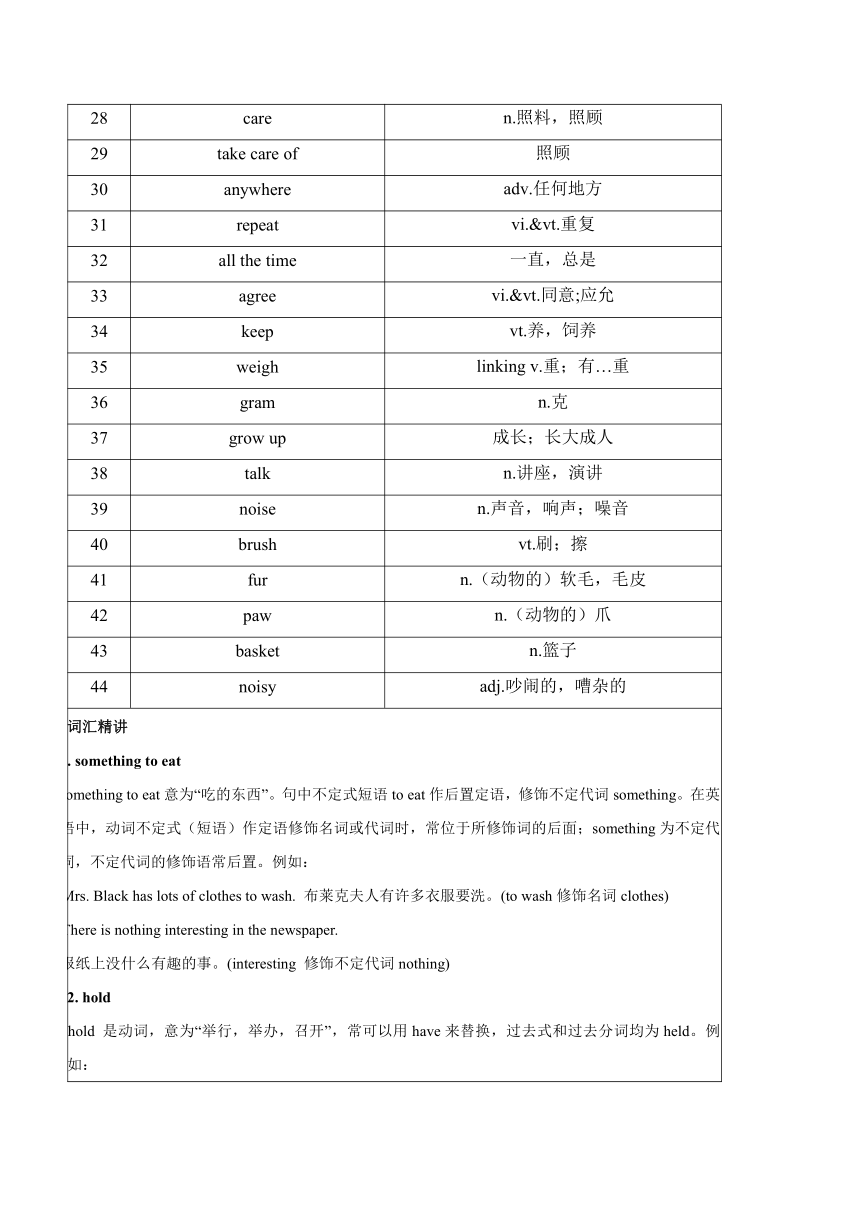
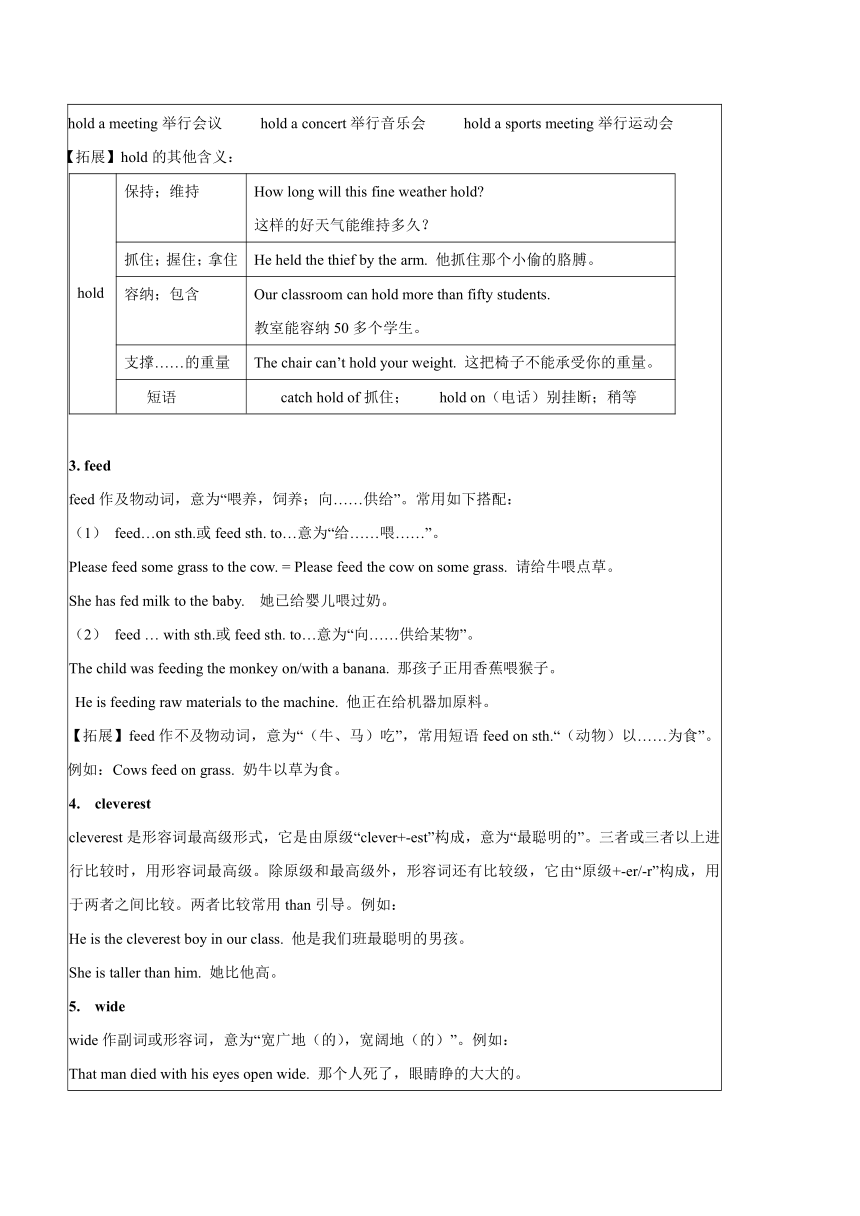
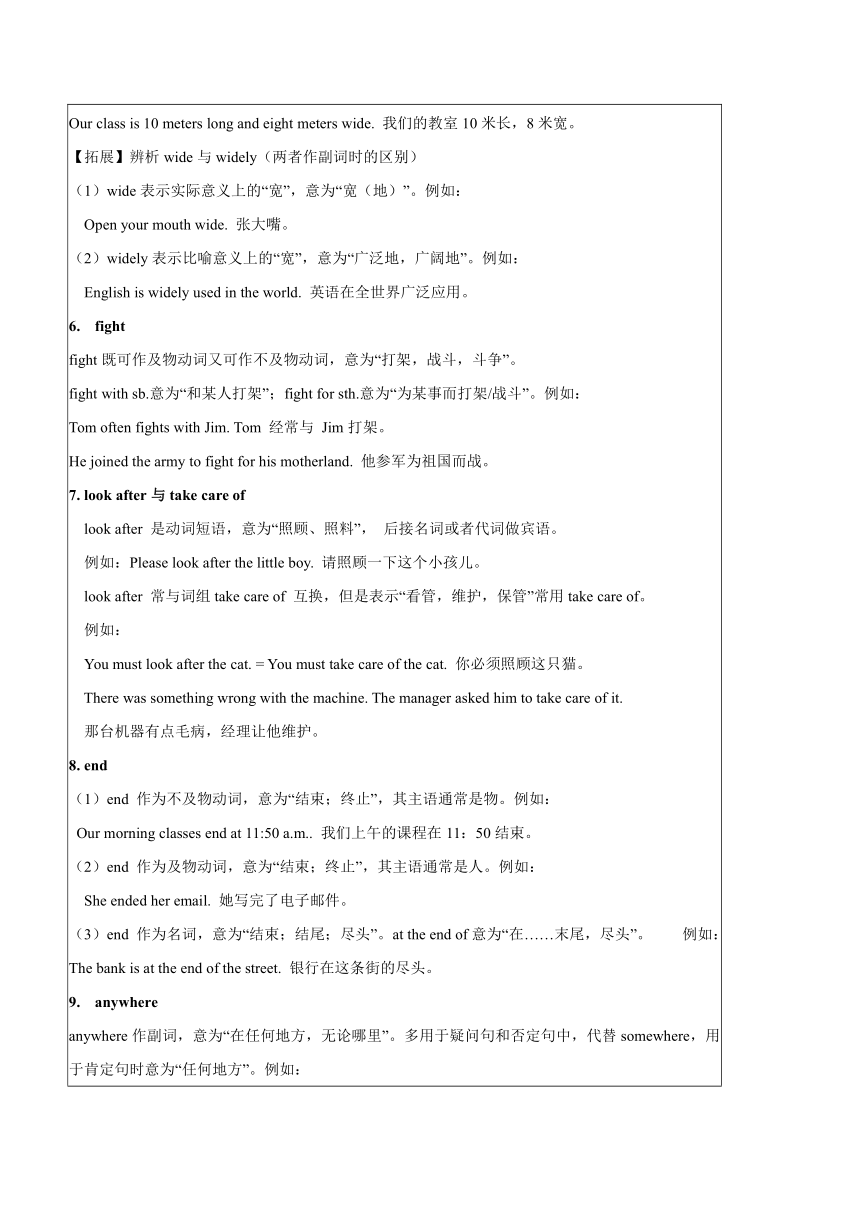
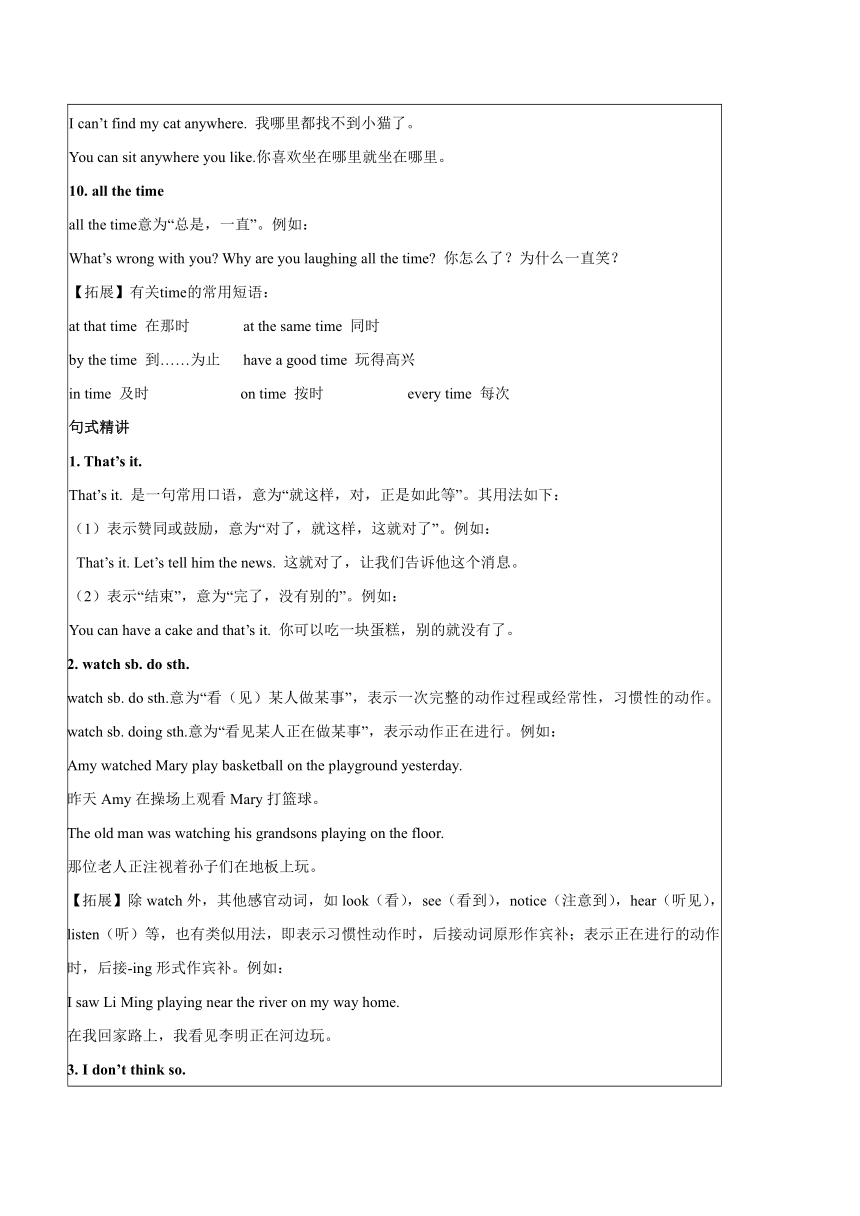
文档简介
牛津译林版七年级英语下册Unit8知识点复习汇总
1 pet n.宠物
2 rude adj.粗鲁的,不礼貌的
3 goldfish n.金鱼
4 mouse n.老鼠,耗子
5 parrot n.鹦鹉
6 knee n.膝,膝盖,大腿朝上的面
7 hold vt.握住,拿
8 feed vt.喂,喂养
9 teach vt.教
10 poem n.诗歌
11 wide adv.充分地
12 hunt vi.&vt.寻找,搜寻;打猎
13 hide vi.&vt.藏,隐藏
14 build vt.建造,建筑
15 camp n.营地,阵营
16 stick n.树枝,枝条;棍,棒
17 bark vi.(狗)吠,叫
18 bite vi.&vt.咬
19 fight vi.&vt.与…打仗(架)
20 look after 照顾
21 till prep.到…时,直到…为止
22 end n.终止,末尾,终点
23 trouble n.麻烦
24 bubble vi.吐泡泡
25 gentle adj.温柔的
26 touch n.触摸,碰
27 rhyme vi.押韵
28 care n.照料,照顾
29 take care of 照顾
30 anywhere adv.任何地方
31 repeat vi.&vt.重复
32 all the time 一直,总是
33 agree vi.&vt.同意;应允
34 keep vt.养,饲养
35 weigh linking v.重;有…重
36 gram n.克
37 grow up 成长;长大成人
38 talk n.讲座,演讲
39 noise n.声音,响声;噪音
40 brush vt.刷;擦
41 fur n.(动物的)软毛,毛皮
42 paw n.(动物的)爪
43 basket n.篮子
44 noisy adj.吵闹的,嘈杂的
词汇精讲
1. something to eat
something to eat意为“吃的东西”。句中不定式短语to eat作后置定语,修饰不定代词something。在英语中,动词不定式(短语)作定语修饰名词或代词时,常位于所修饰词的后面;something为不定代词,不定代词的修饰语常后置。例如: Mrs. Black has lots of clothes to wash. 布莱克夫人有许多衣服要洗。(to wash修饰名词clothes)
There is nothing interesting in the newspaper.
报纸上没什么有趣的事。(interesting 修饰不定代词nothing)
2. hold
hold 是动词,意为“举行,举办,召开”,常可以用have来替换,过去式和过去分词均为held。例如:
hold a meeting举行会议 hold a concert举行音乐会 hold a sports meeting举行运动会
【拓展】hold的其他含义:
hold
保持;维持
How long will this fine weather hold?
这样的好天气能维持多久?
抓住;握住;拿住
He held the thief by the arm. 他抓住那个小偷的胳膊。
容纳;包含
Our classroom can hold more than fifty students.
教室能容纳50多个学生。
支撑……的重量
The chair can’t hold your weight. 这把椅子不能承受你的重量。
短语
Catc catch hold of抓住; hold on(电话)别挂断;稍等
3. feed
feed作及物动词,意为“喂养,饲养;向……供给”。常用如下搭配:
(1) feed…on sth.或feed sth. to…意为“给……喂……”。
Please feed some grass to the cow. = Please feed the cow on some grass. 请给牛喂点草。
She has fed milk to the baby. 她已给婴儿喂过奶。
(2) feed … with sth.或feed sth. to…意为“向……供给某物”。
The child was feeding the monkey on/with a banana. 那孩子正用香蕉喂猴子。
He is feeding raw materials to the machine. 他正在给机器加原料。
【拓展】feed作不及物动词,意为“(牛、马)吃”,常用短语feed on sth.“(动物)以……为食”。例如:Cows feed on grass. 奶牛以草为食。
cleverest
cleverest是形容词最高级形式,它是由原级“clever+-est”构成,意为“最聪明的”。三者或三者以上进行比较时,用形容词最高级。除原级和最高级外,形容词还有比较级,它由“原级+-er/-r”构成,用于两者之间比较。两者比较常用than引导。例如:
He is the cleverest boy in our class. 他是我们班最聪明的男孩。
She is taller than him. 她比他高。
wide
wide作副词或形容词,意为“宽广地(的),宽阔地(的)”。例如:
That man died with his eyes open wide. 那个人死了,眼睛睁的大大的。
Our class is 10 meters long and eight meters wide. 我们的教室10米长,8米宽。
【拓展】辨析wide与widely(两者作副词时的区别)
(1)wide表示实际意义上的“宽”,意为“宽(地)”。例如:
Open your mouth wide. 张大嘴。
(2)widely表示比喻意义上的“宽”,意为“广泛地,广阔地”。例如:
English is widely used in the world. 英语在全世界广泛应用。
fight
fight既可作及物动词又可作不及物动词,意为“打架,战斗,斗争”。
fight with sb.意为“和某人打架”;fight for sth.意为“为某事而打架/战斗”。例如:
Tom often fights with Jim. Tom 经常与 Jim打架。
He joined the army to fight for his motherland. 他参军为祖国而战。
7. look after与take care of
look after 是动词短语,意为“照顾、照料”, 后接名词或者代词做宾语。
例如:Please look after the little boy. 请照顾一下这个小孩儿。
look after 常与词组take care of 互换,但是表示“看管,维护,保管”常用take care of。
例如:
You must look after the cat. = You must take care of the cat. 你必须照顾这只猫。
There was something wrong with the machine. The manager asked him to take care of it.
那台机器有点毛病,经理让他维护。
8. end
(1)end 作为不及物动词,意为“结束;终止”,其主语通常是物。例如:
Our morning classes end at 11:50 a.m.. 我们上午的课程在11:50结束。
(2)end 作为及物动词,意为“结束;终止”,其主语通常是人。例如:
She ended her email. 她写完了电子邮件。
(3)end 作为名词,意为“结束;结尾;尽头”。at the end of意为“在……末尾,尽头”。 例如:The bank is at the end of the street. 银行在这条街的尽头。
anywhere
anywhere作副词,意为“在任何地方,无论哪里”。多用于疑问句和否定句中,代替somewhere,用于肯定句时意为“任何地方”。例如:
I can’t find my cat anywhere. 我哪里都找不到小猫了。
You can sit anywhere you like.你喜欢坐在哪里就坐在哪里。
10. all the time
all the time意为“总是,一直”。例如:
What’s wrong with you? Why are you laughing all the time? 你怎么了?为什么一直笑?
【拓展】有关time的常用短语:
at that time 在那时 at the same time 同时
by the time 到……为止 have a good time 玩得高兴
in time 及时 on time 按时 every time 每次
句式精讲
1. That’s it.
That’s it. 是一句常用口语,意为“就这样,对,正是如此等”。其用法如下:
(1)表示赞同或鼓励,意为“对了,就这样,这就对了”。例如:
That’s it. Let’s tell him the news. 这就对了,让我们告诉他这个消息。
(2)表示“结束”,意为“完了,没有别的”。例如:
You can have a cake and that’s it. 你可以吃一块蛋糕,别的就没有了。
2. watch sb. do sth.
watch sb. do sth.意为“看(见)某人做某事”,表示一次完整的动作过程或经常性,习惯性的动作。watch sb. doing sth.意为“看见某人正在做某事”,表示动作正在进行。例如:
Amy watched Mary play basketball on the playground yesterday.
昨天Amy在操场上观看Mary打篮球。
The old man was watching his grandsons playing on the floor.
那位老人正注视着孙子们在地板上玩。
【拓展】除watch外,其他感官动词,如look(看),see(看到),notice(注意到),hear(听见),listen(听)等,也有类似用法,即表示习惯性动作时,后接动词原形作宾补;表示正在进行的动作时,后接-ing形式作宾补。例如:
I saw Li Ming playing near the river on my way home.
在我回家路上,我看见李明正在河边玩。
3. I don’t think so.
I don’t think so. 用于否定对方提出的观点或看法,意为“我不这样认为”。?其中so是代词,代替前面所说的话或句子。常用在believe“相信”;suppose“设想”;hope“希望”等词之后。相反,I think so. 意为“我认为是这样”。例如:
— It is beautiful. 这个很漂亮。
— I don’t think so. 我不这样认为。?
— Do you think it will rain? 你认为会下雨吗?
— Yes, I think so. 是的,我认为是。
【拓展】I don’t think so.同I think not. 类似的词有believe,suppose,be afraid等。
4. Put your goldfish in the sun.
in the sun意为“在阳光下”,常用作状语。如:
My grandpa likes lying in the sun. 我爷爷喜欢躺在阳光下。
【拓展】
(1) under the sun 意为“世界上,天底下”,相当于in the world,on the earth。常用作后置定语,强调所修饰的对象。
例如:I think you are the best person under the sun. Thank you for your great help.
我想你是天底下最好的人,谢谢你极大的帮助。
(2)与in the sun类似的短语还有: in the light在灯光下;in the rain在雨中
Peter is listening to a talk on goldfish and…
a talk on…意为“关于……的报告”。on作介词,意为“关于”。
【拓展】on与about
on与about 二者都是介词,意为“关于,论及”等,一般情况下,二者可以互相替换,但二者有点区别:
about常用于简单的或浅显的论述等,是一般用语,多用于讲故事,谈话;思考等;
on多用于系统论述或专题讲演、论著等,具有学术性。例如:
The teacher told us a story about Lei Feng. It’s very moving.
老师给我们讲了一个有关雷锋的故事。故事很感人。
He will give us a talk on the history of the Party.
他将给我们做个关于党史的报告。
正误例析:
今天下午我们将听一个关于非洲历史的演讲。
误:We’re going to listen to a lecture about African history this afternoon.
正:We’re going to listen to a lecture on African history this afternoon.
解析:介词about和on都可以作“关于”解。on表示一本书、文章或演讲是严肃的、学术性的,可供专门研究这一问题的人们参考;about则表示其内容比较通俗,一般人都可阅读。
【聚焦中考】:Unit8 必考知识点汇编 考点一:考查bring和take词义辨析
Bring me something to eat.给我拿些吃的东西来。(教材第92页)
中考链接
—Must I ______ my camera, Mary?
—No, you ______. Don’t worry. I’ll take one myself.
A. bring, can’t B. take, mustn’t C. take, needn't
【答案】C
【解析】bring表示“拿来,带来”,take表示“拿走,带走“。对含有must的问句作否定回答,应用needn’t,根据句意,故选C。
考点二:考查形容词最高级的用法
My dog is the cleverest animals of all.所有动物中我的狗最聪明。(教材第94页)
中考链接
My son is only 12 years old, but he is ______ in our family. He grows so fast.
A. tall B. taller C. tallest D. the tallest
【答案】D
【解析】本题考查形容词最高级的用法。根据句意“我的儿子只有12岁,但他在我们家最高”可知,表示在三者或三者以上中“最……”应用最高级形式,并且其前应加冠词the,故选D。
考点三:考查非谓语动词的用法
Goldfish are quiet and easy to look after.
金鱼很安静,很容易照顾。(教材第98页)
中考链接
Paul made a nice cage ____ the little sick bird till it could fly.
A. keep B. kept C. keeping D. to keep
【答案】D
【解析】本题考查非谓语动词的用法。根据句意“保罗做了一个好笼子来养这个生病的小鸟,直到它能飞为止”可知,应用动词不定式作目的状语,故选D。
考点四:考查millions of的用法
There are millions of websites on the Internet.
因特网上有数百万个网站。(教材第101页)
中考链接
____ fans would like to go to Brazil to watch the World Cup.
A. Million of B. Millions of C. Millions
【答案】B
【解析】当million表示具体的数目时,用单数形式;当表示不具体的数目时,用复数形式,且与介词of连用,millions of意为“数以百万计的,许许多多的”,是固定搭配,故选B。
Hobo.Bring me something to eat.带给我一些吃的东西
How rude you are!
I like watching them swim around.
like watching them swim around喜欢看它们游来游去
I love my parrot because he can sing,and I want to teach him to speak.
She loves to sleep on my knees.
sleep on my knees睡在我的膝盖上
teach him to speak将他讲话
Teach sb to do sth教某人做某事
It’s very small and soft and I can hold it in my hand.
hold it in my hand把它握在我的手里
He doesn’t just run after a ball.
run after a ball追赶球
With eyes open wide,he hunts when I hide.
With eyes open wide眼睛睁得大大地
He does wonderful tricks,builds me camps out of sticks.
does wonderful tricks耍精彩的把戏
Build...out of...用...建...
He’d never bark or bite and doesn’t like to fight.
never bark or bite从来不叫也不咬
I can feed her carrots and I like her long ears.
I’ll look after him till the end.
till the end直到最后
She isn’t any trouble.
She doesn’t need a gentle touch.
need a gentle touch需要一个温柔的抚摸
All rhymes with ball.
rhymes with和...押韵
He looks around for me.
look around for me到处找我
He does not make any trouble.
Make trouble惹麻烦
I’ll always take care of him.
She sleeps anywhere.
He is very clever,and he can repeat my words.
repeat my words重复我的话
Do you feed him something else?
feed him something else喂给他一些别的东西
He is happy all the time.
I don’t agree.There is nothing wrong with keeping a snake if you like it.
keeping a snake养蛇
Do not put them in the sun.
in the sun在阳光下
A goldfish can weigh up to 40 grams.
weigh up to 40 grams重达40千克
They can grow up to be 20 centimetres long and weigh up to 400 grams.
grow up to be 20 centimetres long长到20厘米长
Do you make any noise?
make noise吵闹
We only brush her fur every day.
brush her fur刷她的毛
She likes sleeping in a basket.
sleep in a basket睡在篮子里
There was a talk in the Pet Club yesterday.
▲词组
something to eat —些吃的东西
feed her carrots
喂她胡萝卜
sleep on my knees
在我膝盖上睡觉
teach him to speak
教他说话
play with him
和他玩耍
the cleverest animal of all
其中最聪明的动物
till the end
直到最后
take care of/look after
照看,照顾
make noise
发出噪音
repeat my words
重复我的话
brush the fur
刷毛
bring sb sth
给某人带来某物
a gentle touch
温柔的抚摸
all the time
一直,总是
be nice to
对...好
pick them up with your hands
用手把它们拿起来
do wonderful tricks
玩精彩的把戏
weigh up to40 grams
重达40克
once a day
一天一次
white paws
白色的爪子
sleep in a basket
睡在篮子里
with eyes open wide
眼睛睁得大大的
grow up
成长;长大成人
millions of...
数百万的...
type in
输入
in the sun
在阳光下
how to look after them
如何照顾它们
a friend of mine
我的一位朋友
keep a pet at home
在家养一只宠物
with the help of
在...的帮助下
1 pet n.宠物
2 rude adj.粗鲁的,不礼貌的
3 goldfish n.金鱼
4 mouse n.老鼠,耗子
5 parrot n.鹦鹉
6 knee n.膝,膝盖,大腿朝上的面
7 hold vt.握住,拿
8 feed vt.喂,喂养
9 teach vt.教
10 poem n.诗歌
11 wide adv.充分地
12 hunt vi.&vt.寻找,搜寻;打猎
13 hide vi.&vt.藏,隐藏
14 build vt.建造,建筑
15 camp n.营地,阵营
16 stick n.树枝,枝条;棍,棒
17 bark vi.(狗)吠,叫
18 bite vi.&vt.咬
19 fight vi.&vt.与…打仗(架)
20 look after 照顾
21 till prep.到…时,直到…为止
22 end n.终止,末尾,终点
23 trouble n.麻烦
24 bubble vi.吐泡泡
25 gentle adj.温柔的
26 touch n.触摸,碰
27 rhyme vi.押韵
28 care n.照料,照顾
29 take care of 照顾
30 anywhere adv.任何地方
31 repeat vi.&vt.重复
32 all the time 一直,总是
33 agree vi.&vt.同意;应允
34 keep vt.养,饲养
35 weigh linking v.重;有…重
36 gram n.克
37 grow up 成长;长大成人
38 talk n.讲座,演讲
39 noise n.声音,响声;噪音
40 brush vt.刷;擦
41 fur n.(动物的)软毛,毛皮
42 paw n.(动物的)爪
43 basket n.篮子
44 noisy adj.吵闹的,嘈杂的
词汇精讲
1. something to eat
something to eat意为“吃的东西”。句中不定式短语to eat作后置定语,修饰不定代词something。在英语中,动词不定式(短语)作定语修饰名词或代词时,常位于所修饰词的后面;something为不定代词,不定代词的修饰语常后置。例如: Mrs. Black has lots of clothes to wash. 布莱克夫人有许多衣服要洗。(to wash修饰名词clothes)
There is nothing interesting in the newspaper.
报纸上没什么有趣的事。(interesting 修饰不定代词nothing)
2. hold
hold 是动词,意为“举行,举办,召开”,常可以用have来替换,过去式和过去分词均为held。例如:
hold a meeting举行会议 hold a concert举行音乐会 hold a sports meeting举行运动会
【拓展】hold的其他含义:
hold
保持;维持
How long will this fine weather hold?
这样的好天气能维持多久?
抓住;握住;拿住
He held the thief by the arm. 他抓住那个小偷的胳膊。
容纳;包含
Our classroom can hold more than fifty students.
教室能容纳50多个学生。
支撑……的重量
The chair can’t hold your weight. 这把椅子不能承受你的重量。
短语
Catc catch hold of抓住; hold on(电话)别挂断;稍等
3. feed
feed作及物动词,意为“喂养,饲养;向……供给”。常用如下搭配:
(1) feed…on sth.或feed sth. to…意为“给……喂……”。
Please feed some grass to the cow. = Please feed the cow on some grass. 请给牛喂点草。
She has fed milk to the baby. 她已给婴儿喂过奶。
(2) feed … with sth.或feed sth. to…意为“向……供给某物”。
The child was feeding the monkey on/with a banana. 那孩子正用香蕉喂猴子。
He is feeding raw materials to the machine. 他正在给机器加原料。
【拓展】feed作不及物动词,意为“(牛、马)吃”,常用短语feed on sth.“(动物)以……为食”。例如:Cows feed on grass. 奶牛以草为食。
cleverest
cleverest是形容词最高级形式,它是由原级“clever+-est”构成,意为“最聪明的”。三者或三者以上进行比较时,用形容词最高级。除原级和最高级外,形容词还有比较级,它由“原级+-er/-r”构成,用于两者之间比较。两者比较常用than引导。例如:
He is the cleverest boy in our class. 他是我们班最聪明的男孩。
She is taller than him. 她比他高。
wide
wide作副词或形容词,意为“宽广地(的),宽阔地(的)”。例如:
That man died with his eyes open wide. 那个人死了,眼睛睁的大大的。
Our class is 10 meters long and eight meters wide. 我们的教室10米长,8米宽。
【拓展】辨析wide与widely(两者作副词时的区别)
(1)wide表示实际意义上的“宽”,意为“宽(地)”。例如:
Open your mouth wide. 张大嘴。
(2)widely表示比喻意义上的“宽”,意为“广泛地,广阔地”。例如:
English is widely used in the world. 英语在全世界广泛应用。
fight
fight既可作及物动词又可作不及物动词,意为“打架,战斗,斗争”。
fight with sb.意为“和某人打架”;fight for sth.意为“为某事而打架/战斗”。例如:
Tom often fights with Jim. Tom 经常与 Jim打架。
He joined the army to fight for his motherland. 他参军为祖国而战。
7. look after与take care of
look after 是动词短语,意为“照顾、照料”, 后接名词或者代词做宾语。
例如:Please look after the little boy. 请照顾一下这个小孩儿。
look after 常与词组take care of 互换,但是表示“看管,维护,保管”常用take care of。
例如:
You must look after the cat. = You must take care of the cat. 你必须照顾这只猫。
There was something wrong with the machine. The manager asked him to take care of it.
那台机器有点毛病,经理让他维护。
8. end
(1)end 作为不及物动词,意为“结束;终止”,其主语通常是物。例如:
Our morning classes end at 11:50 a.m.. 我们上午的课程在11:50结束。
(2)end 作为及物动词,意为“结束;终止”,其主语通常是人。例如:
She ended her email. 她写完了电子邮件。
(3)end 作为名词,意为“结束;结尾;尽头”。at the end of意为“在……末尾,尽头”。 例如:The bank is at the end of the street. 银行在这条街的尽头。
anywhere
anywhere作副词,意为“在任何地方,无论哪里”。多用于疑问句和否定句中,代替somewhere,用于肯定句时意为“任何地方”。例如:
I can’t find my cat anywhere. 我哪里都找不到小猫了。
You can sit anywhere you like.你喜欢坐在哪里就坐在哪里。
10. all the time
all the time意为“总是,一直”。例如:
What’s wrong with you? Why are you laughing all the time? 你怎么了?为什么一直笑?
【拓展】有关time的常用短语:
at that time 在那时 at the same time 同时
by the time 到……为止 have a good time 玩得高兴
in time 及时 on time 按时 every time 每次
句式精讲
1. That’s it.
That’s it. 是一句常用口语,意为“就这样,对,正是如此等”。其用法如下:
(1)表示赞同或鼓励,意为“对了,就这样,这就对了”。例如:
That’s it. Let’s tell him the news. 这就对了,让我们告诉他这个消息。
(2)表示“结束”,意为“完了,没有别的”。例如:
You can have a cake and that’s it. 你可以吃一块蛋糕,别的就没有了。
2. watch sb. do sth.
watch sb. do sth.意为“看(见)某人做某事”,表示一次完整的动作过程或经常性,习惯性的动作。watch sb. doing sth.意为“看见某人正在做某事”,表示动作正在进行。例如:
Amy watched Mary play basketball on the playground yesterday.
昨天Amy在操场上观看Mary打篮球。
The old man was watching his grandsons playing on the floor.
那位老人正注视着孙子们在地板上玩。
【拓展】除watch外,其他感官动词,如look(看),see(看到),notice(注意到),hear(听见),listen(听)等,也有类似用法,即表示习惯性动作时,后接动词原形作宾补;表示正在进行的动作时,后接-ing形式作宾补。例如:
I saw Li Ming playing near the river on my way home.
在我回家路上,我看见李明正在河边玩。
3. I don’t think so.
I don’t think so. 用于否定对方提出的观点或看法,意为“我不这样认为”。?其中so是代词,代替前面所说的话或句子。常用在believe“相信”;suppose“设想”;hope“希望”等词之后。相反,I think so. 意为“我认为是这样”。例如:
— It is beautiful. 这个很漂亮。
— I don’t think so. 我不这样认为。?
— Do you think it will rain? 你认为会下雨吗?
— Yes, I think so. 是的,我认为是。
【拓展】I don’t think so.同I think not. 类似的词有believe,suppose,be afraid等。
4. Put your goldfish in the sun.
in the sun意为“在阳光下”,常用作状语。如:
My grandpa likes lying in the sun. 我爷爷喜欢躺在阳光下。
【拓展】
(1) under the sun 意为“世界上,天底下”,相当于in the world,on the earth。常用作后置定语,强调所修饰的对象。
例如:I think you are the best person under the sun. Thank you for your great help.
我想你是天底下最好的人,谢谢你极大的帮助。
(2)与in the sun类似的短语还有: in the light在灯光下;in the rain在雨中
Peter is listening to a talk on goldfish and…
a talk on…意为“关于……的报告”。on作介词,意为“关于”。
【拓展】on与about
on与about 二者都是介词,意为“关于,论及”等,一般情况下,二者可以互相替换,但二者有点区别:
about常用于简单的或浅显的论述等,是一般用语,多用于讲故事,谈话;思考等;
on多用于系统论述或专题讲演、论著等,具有学术性。例如:
The teacher told us a story about Lei Feng. It’s very moving.
老师给我们讲了一个有关雷锋的故事。故事很感人。
He will give us a talk on the history of the Party.
他将给我们做个关于党史的报告。
正误例析:
今天下午我们将听一个关于非洲历史的演讲。
误:We’re going to listen to a lecture about African history this afternoon.
正:We’re going to listen to a lecture on African history this afternoon.
解析:介词about和on都可以作“关于”解。on表示一本书、文章或演讲是严肃的、学术性的,可供专门研究这一问题的人们参考;about则表示其内容比较通俗,一般人都可阅读。
【聚焦中考】:Unit8 必考知识点汇编 考点一:考查bring和take词义辨析
Bring me something to eat.给我拿些吃的东西来。(教材第92页)
中考链接
—Must I ______ my camera, Mary?
—No, you ______. Don’t worry. I’ll take one myself.
A. bring, can’t B. take, mustn’t C. take, needn't
【答案】C
【解析】bring表示“拿来,带来”,take表示“拿走,带走“。对含有must的问句作否定回答,应用needn’t,根据句意,故选C。
考点二:考查形容词最高级的用法
My dog is the cleverest animals of all.所有动物中我的狗最聪明。(教材第94页)
中考链接
My son is only 12 years old, but he is ______ in our family. He grows so fast.
A. tall B. taller C. tallest D. the tallest
【答案】D
【解析】本题考查形容词最高级的用法。根据句意“我的儿子只有12岁,但他在我们家最高”可知,表示在三者或三者以上中“最……”应用最高级形式,并且其前应加冠词the,故选D。
考点三:考查非谓语动词的用法
Goldfish are quiet and easy to look after.
金鱼很安静,很容易照顾。(教材第98页)
中考链接
Paul made a nice cage ____ the little sick bird till it could fly.
A. keep B. kept C. keeping D. to keep
【答案】D
【解析】本题考查非谓语动词的用法。根据句意“保罗做了一个好笼子来养这个生病的小鸟,直到它能飞为止”可知,应用动词不定式作目的状语,故选D。
考点四:考查millions of的用法
There are millions of websites on the Internet.
因特网上有数百万个网站。(教材第101页)
中考链接
____ fans would like to go to Brazil to watch the World Cup.
A. Million of B. Millions of C. Millions
【答案】B
【解析】当million表示具体的数目时,用单数形式;当表示不具体的数目时,用复数形式,且与介词of连用,millions of意为“数以百万计的,许许多多的”,是固定搭配,故选B。
Hobo.Bring me something to eat.带给我一些吃的东西
How rude you are!
I like watching them swim around.
like watching them swim around喜欢看它们游来游去
I love my parrot because he can sing,and I want to teach him to speak.
She loves to sleep on my knees.
sleep on my knees睡在我的膝盖上
teach him to speak将他讲话
Teach sb to do sth教某人做某事
It’s very small and soft and I can hold it in my hand.
hold it in my hand把它握在我的手里
He doesn’t just run after a ball.
run after a ball追赶球
With eyes open wide,he hunts when I hide.
With eyes open wide眼睛睁得大大地
He does wonderful tricks,builds me camps out of sticks.
does wonderful tricks耍精彩的把戏
Build...out of...用...建...
He’d never bark or bite and doesn’t like to fight.
never bark or bite从来不叫也不咬
I can feed her carrots and I like her long ears.
I’ll look after him till the end.
till the end直到最后
She isn’t any trouble.
She doesn’t need a gentle touch.
need a gentle touch需要一个温柔的抚摸
All rhymes with ball.
rhymes with和...押韵
He looks around for me.
look around for me到处找我
He does not make any trouble.
Make trouble惹麻烦
I’ll always take care of him.
She sleeps anywhere.
He is very clever,and he can repeat my words.
repeat my words重复我的话
Do you feed him something else?
feed him something else喂给他一些别的东西
He is happy all the time.
I don’t agree.There is nothing wrong with keeping a snake if you like it.
keeping a snake养蛇
Do not put them in the sun.
in the sun在阳光下
A goldfish can weigh up to 40 grams.
weigh up to 40 grams重达40千克
They can grow up to be 20 centimetres long and weigh up to 400 grams.
grow up to be 20 centimetres long长到20厘米长
Do you make any noise?
make noise吵闹
We only brush her fur every day.
brush her fur刷她的毛
She likes sleeping in a basket.
sleep in a basket睡在篮子里
There was a talk in the Pet Club yesterday.
▲词组
something to eat —些吃的东西
feed her carrots
喂她胡萝卜
sleep on my knees
在我膝盖上睡觉
teach him to speak
教他说话
play with him
和他玩耍
the cleverest animal of all
其中最聪明的动物
till the end
直到最后
take care of/look after
照看,照顾
make noise
发出噪音
repeat my words
重复我的话
brush the fur
刷毛
bring sb sth
给某人带来某物
a gentle touch
温柔的抚摸
all the time
一直,总是
be nice to
对...好
pick them up with your hands
用手把它们拿起来
do wonderful tricks
玩精彩的把戏
weigh up to40 grams
重达40克
once a day
一天一次
white paws
白色的爪子
sleep in a basket
睡在篮子里
with eyes open wide
眼睛睁得大大的
grow up
成长;长大成人
millions of...
数百万的...
type in
输入
in the sun
在阳光下
how to look after them
如何照顾它们
a friend of mine
我的一位朋友
keep a pet at home
在家养一只宠物
with the help of
在...的帮助下
